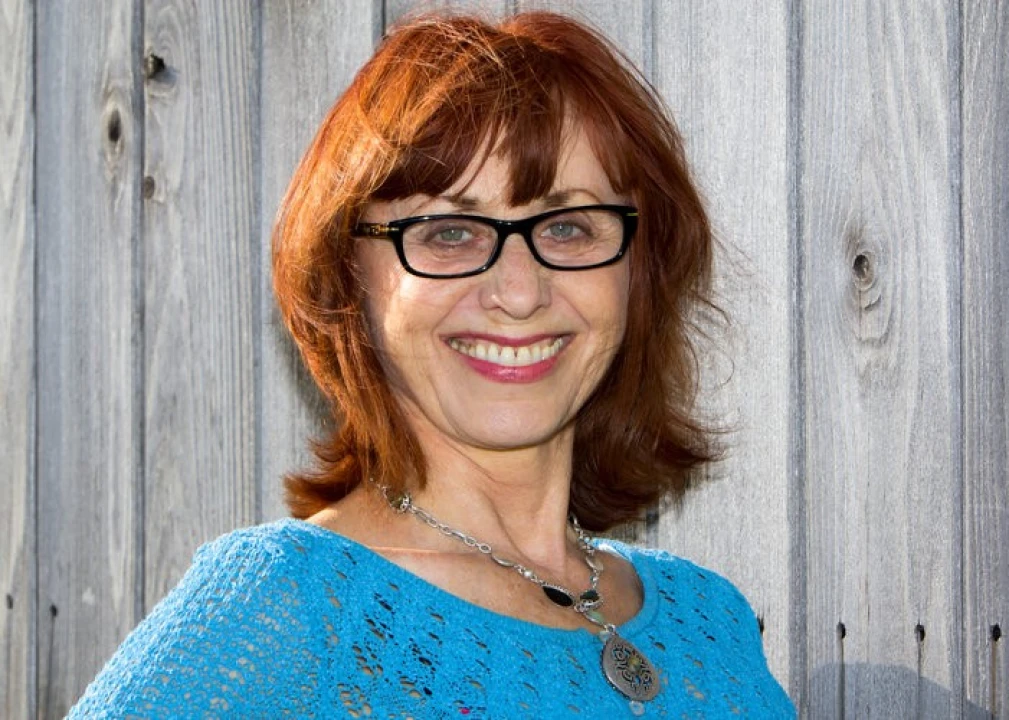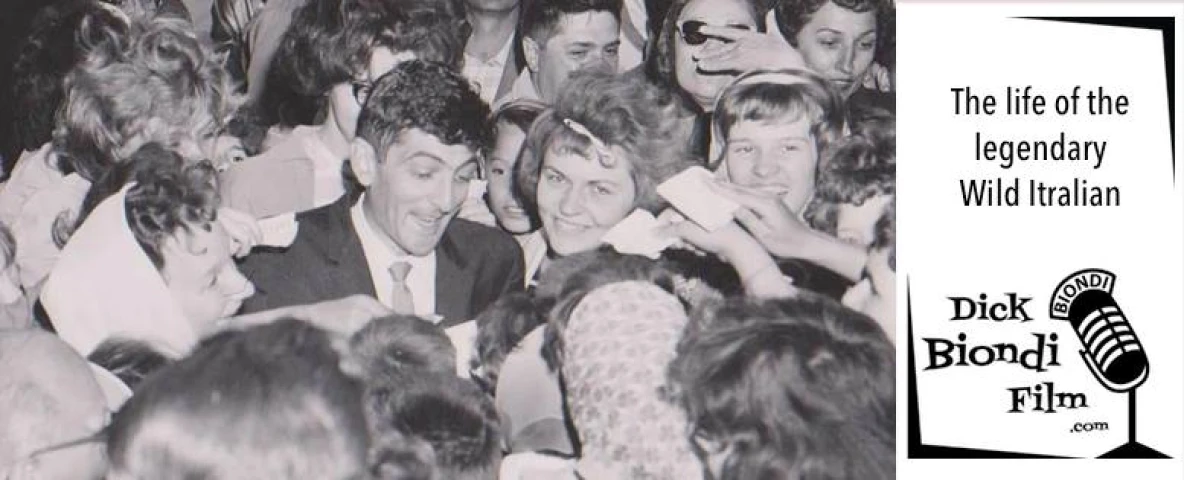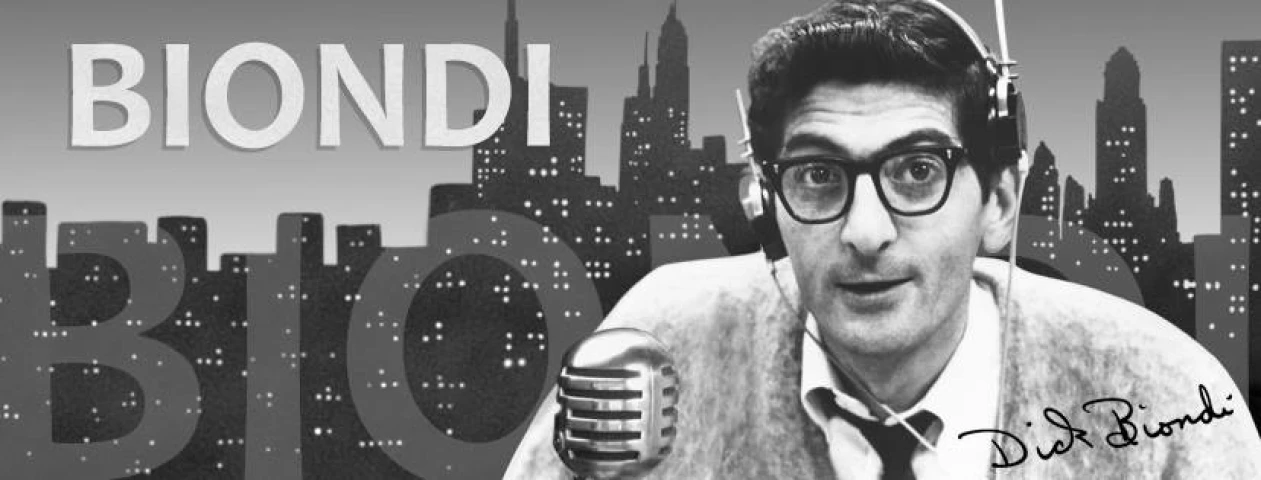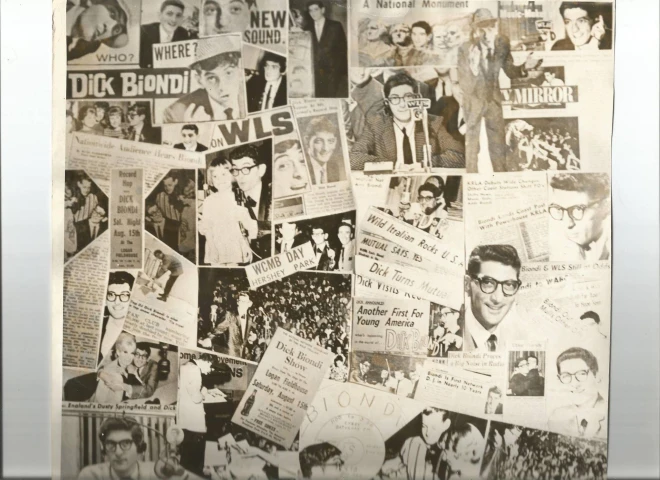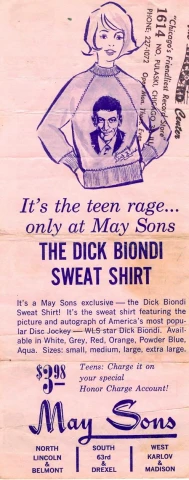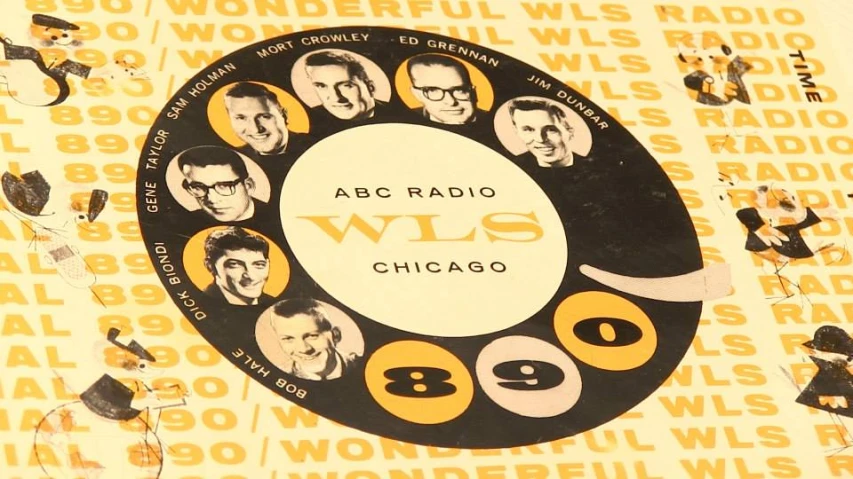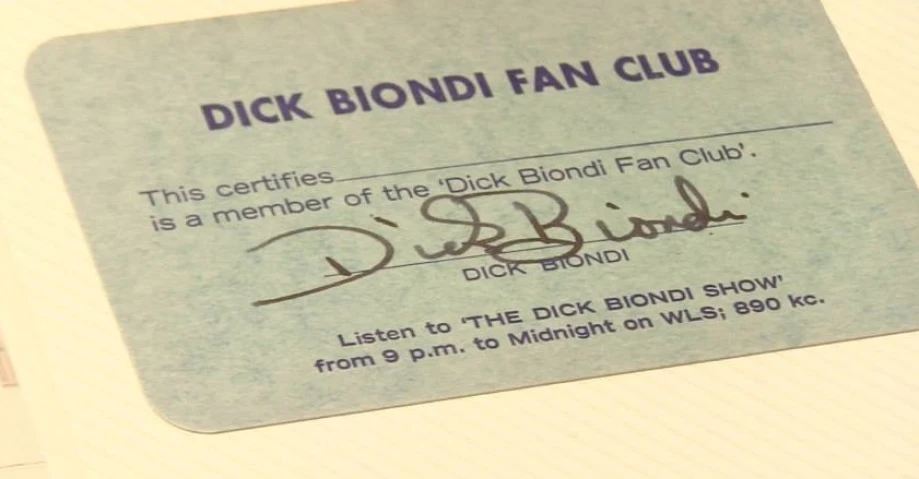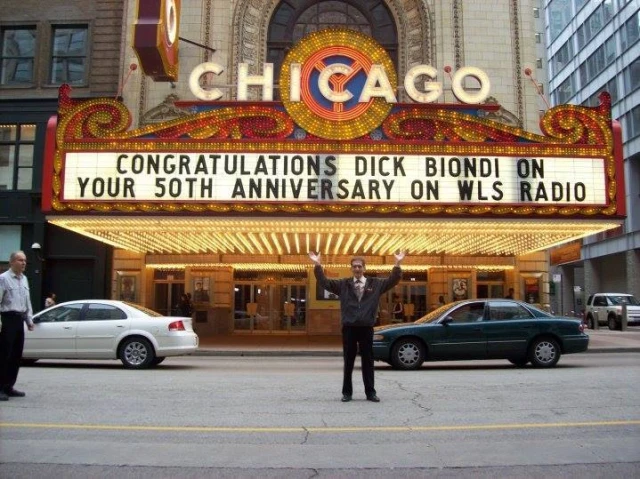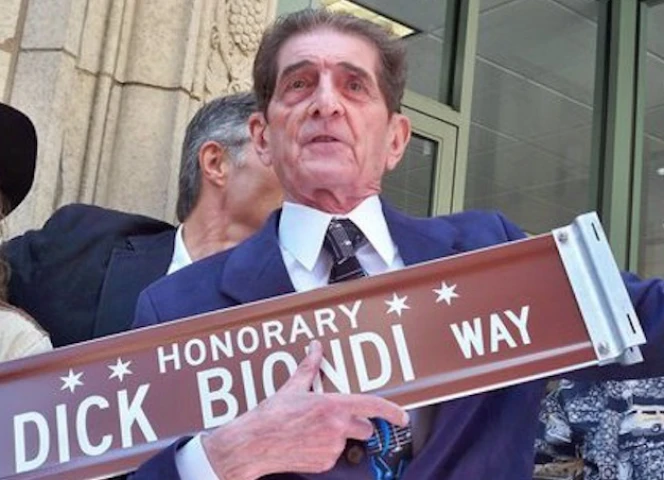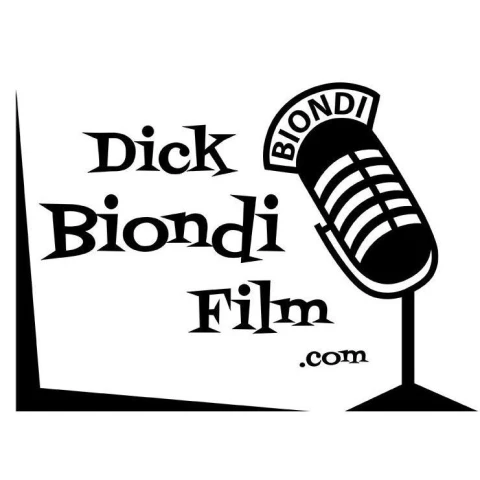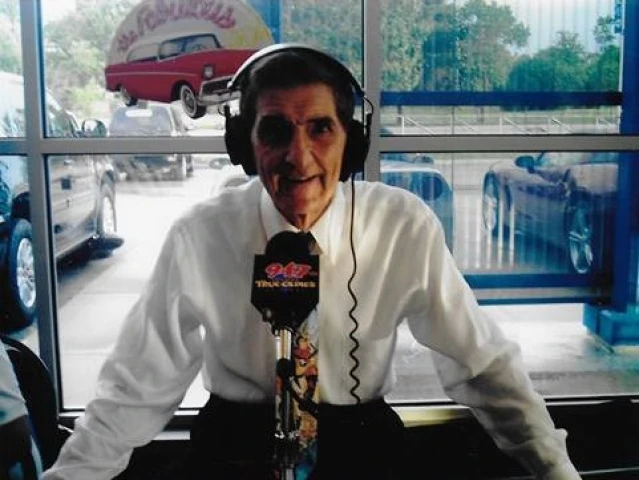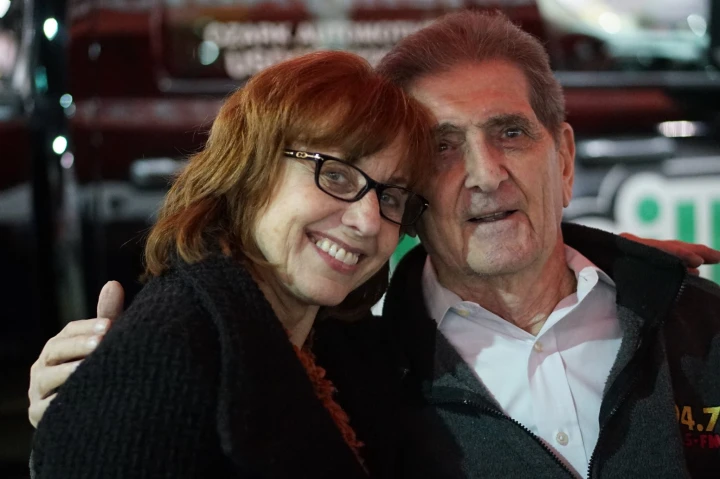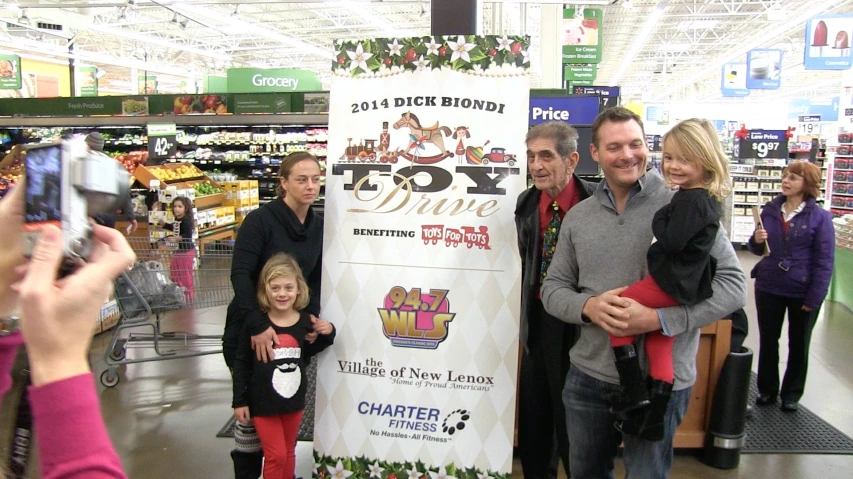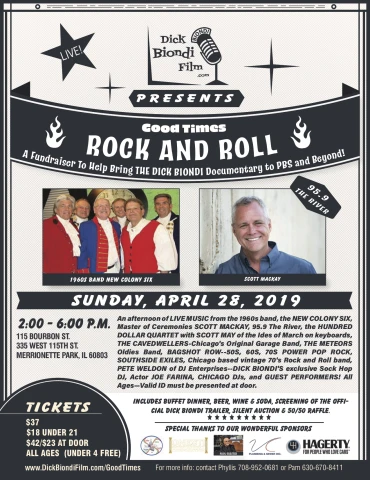The story of Dick Biondi is unknown to many. I didn't know about it myself, but today there is who is working on a documentary that will tell all Americans, and in particular those of Italian origin, about the life and career of the number one DJ in the United States in the early '60s, the first ever to play the Beatles on an American radio.
Pamela Enzweiler-Pulice, a long-time fan and friend of Dick's, is our today’s guest. She is the driving force behind the creation and production of this interesting documentary. We will learn to know the great Dick Biondi, and to discover that his gifts and the details of his character are those typical of the Italian Americans that we love so much here at We the Italians.
Pamela, first of all: who is Dick Biondi, and how did he start working in radio? How did he become the number one DJ in America?
Dick Biondi is one of the most influential radio personalities of the 20th century. He was the first to play a Beatles record on the radio in the United States. He was a rock and roll pioneer who introduced Elvis Presley, Jerry Lee Lewis, Bobby Darin, and many artists, not only on the radio but at his sock hops which he was known for. He later introduced The Beatles and The Rolling Stones in concert.
He was the number one disc jockey in America in 1961 and 1962. I met him in 1961, and I didn’t’ realize he was number one at that time because he was such a sincere, humble man. And that’s why I started a fan club for him.
Dick Biondi is a member of Broadcast Hall of Fame, the Rock and Roll Hall of Fame, and, this is so funny, he was probably the … most fired disc jockey ever. Dick has been fired 25 times during his career. He calls himself “The Wild I-tralian.” Dick was so unique back in the days when we were listening on our AM transistor radios.
In those days disc jockeys were polite, and they would give the time and temperature, and all of the sudden you got this wild, crazy guy on the radio that we had never heard anything like. It was just so amazing. He was a real trendsetter. He had such passion it came through the microphone and connected with you. He was like electricity, a personality with unbelievable charisma.
Dick was born in 1932 in a little town called Endicott, in Upper State New York. He came from a working class family and one day he went to visit his grandparents, he used to go there in summer. He was meandering around town in Auburn, New York, and he found a local radio station. He was completely captivated and would go back day after day and watch the man at the microphone. One day, that man invited him in, handed him a commercial to read on the air and said: “Hey, kid, can you read?” and Dick said: “Yeah.” He’s on the radio reading this commercial, and he didn’t even know he was on the air. When he got home, his family and his friends were very excited: “We heard you on the radio!”: I guess that’s when he got hooked.
From that moment on, he was a big fan of radio, but it wasn’t until high school that he started to throw all of his time to radio. He says he was a terrible high school student because he was always at the radio station. He was a gofer and he would meet a lot of people. One of the people he actually met was Rod Serling from “The Twilight Zone”. He would bring coffee and doughnuts for him. As soon as he graduated high school in 1950, Dick went off and started his career. He went down south to Alexandria, Louisiana, and he started to play Race records: that was before civil rights, you know Jim Crow’s south, and sometimes he would find himself being the only white person in a black club. It was quite an education for him and instilled his love for Rhythm and Blues and when Rock and Roll hit America, he was ready. He went up north in Youngstown, Ohio and that’s when he started the career we know him for… Top 40 radio.
He soon became well-known as a hit maker in Youngstown. He would play a song and he would get people so excited, they would run down to the record store and buy it. Pretty soon, the word got out to the record companies that “Hey, this guy can sell records.”
Then, Dick started doing sock hops and he would have all of the big top artists coming out. A sock hop is a dance where you take your shoes off and dance in your socks. The reason is because they usually did it on a gym floor, which is a wooden floor, and they didn’t want to scuffle it all up, so they would tell the kids to take their shoes off. So many people started coming to the sock hops, that’s when he met Elvis Presley, Jerry Lee Lewis, Frankie Avalon, Bobby Rydell and Bobby Darin, whom Dick became very close friends with.
He was very well-known in Youngstown, and then he went on to Buffalo, New York. He was so popular in Buffalo that he owned the whole Eastern Seaboard of the United States. He was known for being just a wild man. He would do crazy things, like he said on the radio one day that there would be no school and I guess that the absentee rate was just unbelievable.
One day he was in his studio doing his job and the boss came in. He was mad at his wife who was throwing some kind of party and kicked him out of the house. So he came over by Dick and walked in and said: “You’re a terrible disc jockey, you better shape up or you’re going to ship out.” Dick got really upset and he started blaring over the radio: “My boss is such a jerk, he’s driving a grey convertible and he’s going downtown to the theater. If anybody sees him, throw a rock to the window.” Sure enough, someone threw a rock through the window. That’s how crazy he was. And he got fired.
Two weeks later, he got a telegram from Sam Holman who was the guy who hired everybody in Chicago and was starting a brand new radio station called WLS. Dick was hired as the lead guy. He changed the radio world in Chicago. Chicago was a big Mid-western city with a big farm community, and so the station had plenty of farmers as listeners: and Dick changed all of this, overnight to a Rock and Roll radio. People were going crazy, and I was one of them. I’ll never forget the first time I turned on the radio and heard that music. I was “Oh My Gosh,” because we almost couldn’t find rock and roll back then. Suddenly, we had found our station and when Dick Biondi came on at night, oh my goodness, that was it. That’s when my story comes in. I got to know him, and we have remained friends all our lives.
One of the most important moments in his career was in February 1963, when he introduced the first Beatles record to be heard on the radio in the U.S. …
It was February 1963 when a local record company representative came over with a record called “Please Please me” which was on the Veejay label, he handed it to Dick and said: “I think you might like this, take a listen.” Dick listened to it and he played it, and he kept playing it until he got it on the WLS Silver Dollar Survey, which came out every week. Then … he got fired! He took the record to Los Angeles to KRLA and he played the record the second night he was on the air. The phones started to ring and the kids were saying: “Take that crap off and play The Beach Boys!” Because nobody knew who The Beatles were in America. Dick was a year ahead of his time. A year later, The Beatles were all over the country, Dick was actually there when they were introduced at the Hollywood Bowl in Los Angeles. He has some great stories about his time at KRLA: like riding in the limo with The Rolling Stones.
Is there an anecdote, a funny and/or significant story about Dick Biondi, that you want to share with our readers?
There are so many. He kept riding the wave of success in Los Angeles and in New York City he did a national syndicated show for young America. It lasted for about a year. Then he ended up back in Chicago, the place where Dick found his greatest success, the city he calls his second home. Chicago just absolutely loves Dick Biondi, everybody knows his name, everybody adores this man that grew up with them, and a lot of us did. So he was back here in Chicago and he has been on the air until the spring of 2017. He has had a 6-decades-long career. It’s pretty phenomenal: very few disc jockeys were known nation-wide, there were just a handful of them; and for him to last that many years, it’s pretty incredible. It’s a testament to the way he connected with people. Dick loves people, he has an Italian upbringing: he is honest, sincere, very generous with his time. Whenever he could help someone, he would. I think that’s why he is such a beloved figure, he has always dedicated his life to helping others. He wanted to be a priest when he was a boy, I think that even as a DJ he used his voice to bring good to the world. We have great stories from a lot of people who he has touched throughout his life. So this is a tribute to Dick.
Generous, wild, talented: this speaks definitely Italian American to me. Who is his favorite Italian American singer?
He loved Elvis Presley, but his favorite all-time singer was the very talented Bobby Darin: they became very close friends. Bobby actually went and had an audience with the Pope in Italy and had some medals blessed, and gave one of those medals to Dick. And Dick cherishes that medal to this day. It means a lot to him, because Bobby Darin died early, much too young. Dick was supposed to go see him but that day he had had surgery in a hospital out in Los Angeles and Dick called him up and said: “I’m going to come see you tomorrow after the surgery.” Bobby died on the operating table. Dick never got to say goodbye to him and that really upset him.
He did a lot of charity, too: what was the annual Dick Biondi Toy Drive?
Dick Biondi started doing Christmas shows way back in his early career. It’s his favorite holiday and it means a lot to him because he had a big Italian family, they would always come together for the Holidays of course. So, Dick has a soft spot for children who don’t have this luxury of having Christmas presents, so he went out of his way every year to have the Dick Biondi Toy Drive up until few years ago: he got a little older and he couldn’t keep it up anymore.
The Dick Biondi Toy Drive was a 36-hour marathon. He would be on the air for 36 hours, and he would have people coming from all over bringing unwrapped toys for the kids, Toys for Tots got involved. Different charities got involved over the years and he had a lot of his friends from the music business come to his Toy Drive and they would perform. The place was absolutely mobbed with people. They would be there, they would bring in pizza, Italian olives, and all kinds of stuff, it was just great. It’s going to be in the movie, we actually have some footage of a couple of Toy Drives that Dick did. He spread a lot of good in the world with his Toy Drive.
How did you come up with the idea of making a documentary?
I met Dick in 1961. I was 13, I started a fan club for Dick. I lived in a suburb of the city of Chicago, and after I met Dick, I started going out of my safe little room and going down to the city and going to sock hops, and going to WLS radio studios. Wherever Dick was I would try to go and be part of it. I would write a newsletter for my Dick Biondi fan club. So when Dick got fired that all ended. We couldn’t believe Dick was gone. Over the years, Dick and I have stayed in touch.
I’ve always known Dick’s story, because I lived it with him and as the years went by, I got into the video business myself. Later in life I actually started my own video production business and I started doing memoirs for people. I showed them to Dick and he really liked them. And I kept thinking in the back of my mind: “I wonder if I could do Dick’s story.” I finally I asked him one day if I could, and he said yes. That’ when it started.
The thing is I have never done a documentary before, this is my first one and it is quite different from just doing a video. There is a lot involved in it which I have been learning. It’s quite an undertaking. It’s a passion project for me. It’s been five years now and we hope to get it done, we are still raising the money. Funding….that’s really the biggest hurdle. It’s really expensive to make a documentary film for broadcast television. We are going to run this on PBS when it’s complete. We have several PBS stations that are interested, we just need to get it done so that’s what we are working toward.
Please tell our readers something about the fundraising event of next April 28. How can we and they help?
We are having a fundraising event in Chicago in a place called Bourbon Street. It’s a big room with a big stage, we’ve got a famous band, the legendary New Colony Six, a Chicago-based rock and roll band from the 1960s that had a lot of major record hits. Dick Biondi was a friend to these guys and promoted them back in the day. We are honored to have them as a headline act along with many other Chicago bands and disk jockeys. We also are going to have an auction. We have an autographed guitar from the band Chicago that we are going to be auctioning off. Another autographed guitar from a local rock star Jim Peterik from The Ides of March and the band Survivor. Tony Orlando is giving us a custom-made tuxedo that he used to wear on his television shows. We got some really interesting gifts. It’s going to be a lot of fun. We have tickets available online at https://www.dickbiondifilm.com/goodtimesfundraiser
We have interviewed over 50 people for our film and that includes famous superstar performers like Frankie Valli, Brian Wilson from The Beach Boys, the band Chicago, so many. We interviewed a lot of the music artists I grew up with. It’s really exciting. A lot of radio people have been interviewed, Dick’s friends, and fans, so we get the fans perspective of the story as well.
Back when Dick Biondi broke through in Chicago radio, he was unlike anybody before and he immediately connected with the kids, including myself. His show was something nobody would miss and it was part of your life. Even though he was a rebel, he was wild, he was goofy, he was all these crazy things, he was also the kindest man and we felt it. He was a role model to us, just a really good positive influence on many kids including me. I think that’s why I’m making this movie.
Plenty of people don’t know Dick’s career and also the man himself. If you have never met him, you may not know how wonderful he is, even if I think it comes through in the radio. Still, meeting him was just another level. I think people should really know his story.
La storia di Dick Biondi è sconosciuta a molti. Io stesso non ne conoscevo l’esistenza, ma oggi è in lavorazione un documentario che racconterà a tutti gli americani, e in particolare quelli di origine italiana, la vita e la carriera del DJ numero uno degli Stati Uniti all’inizio degli anni ’60, il primo a passare i Beatles in una radio americana.
E’ con noi Pamela Enzweiler-Pulice, fan e amica di lunga data di Dick, motore della creazione e della realizzazione di questo interessante documentario. Impareremo a conoscere il grande Dick Biondi, e a scoprire che le sue doti e le caratteristiche del suo personaggio sono quelle tipiche degli italoamericani che tanto amiamo qui a We the Italians.
Pamela, prima di tutto: chi è Dick Biondi, e come iniziò a lavorare in radio? E come divenne il DJ numero uno in America?
Dick Biondi è una delle personalità radiofoniche più influenti del XX secolo. È stato il primo a suonare un disco dei Beatles alla radio negli Stati Uniti. Fu un pioniere del rock and roll che introdusse Elvis Presley, Jerry Lee Lewis, Bobby Darin, e molti artisti, non solo alla radio, ma anche ai suoi “sock hops” per i quali era famoso. In seguito introdusse i Beatles e i Rolling Stones in concerto.
Fu nominato disc jockey numero uno in America nel 1961 e 1962. Io lo incontrai nel 1961, e non sapevo di quel suo primato in quel momento perché di persona era in realtà era molto sincero e umile. Ed è per questo che fondai per un suo fan club.
Dick Biondi è un membro della Broadcast Hall of Fame, la Rock and Roll Hall of Fame, e, immaginate, è probabilmente il ... disc jockey più licenziato di sempre. Dick è stato licenziato 25 volte durante la sua carriera. Si definiva "The Wild I-tralian" ed era davvero unico ai tempi in cui ascoltavamo le nostre radio a transistor AM.
A quei tempi i disc jockey erano gentili e posati, annunciavano il meteo e la temperatura, e all'improvviso alla radio arrivò questo ragazzo pazzo e selvaggio completamente diverso da qualsiasi cosa ci fosse prima di lui, e sorprese tutti. Divenne in breve la persona che lanciava le mode. La sua passione era talmente forte che passava attraverso il microfono e raggiungeva i suoi ascoltatori. Era come l'elettricità, una personalità con un carisma incredibile.
Dick nacque nel 1932 in una piccola città chiamata Endicott, nell'Upper State New York. Veniva da una famiglia operaia e un giorno d’estate andò a trovare i nonni nella città di Auburn, New York, e trovò una stazione radio locale. Rimase completamente affascinato e iniziò ad andare ogni giorno a guardare l'uomo che parlava al microfono. Un giorno, quell'uomo lo invitò a entrare, gli consegnò uno spot pubblicitario da leggere in onda e gli disse: "Ehi, ragazzo, sai leggere?" e Dick disse: "Si'." Lesse lo spot alla radio, e non sapeva nemmeno di essere in onda. Quando tornò a casa, la sua famiglia e i suoi amici erano molto eccitati: "Ti abbiamo sentito alla radio!” Immagino che è così che si appassionò alla radio.
Da quel momento in poi infatti divenne un grande fan del mondo radiofonico, ma solo dal liceo iniziò a dedicare tutto il suo tempo alla radio. Lui dice che era un terribile studente al liceo, perché era sempre alla stazione radio. All’inizio lavorava come fattorino e così incontrava molte persone. Uno di coloro che incontrò fu Rod Serling di "The Twilight Zone". Gli portava il caffè e le ciambelle. Non appena si diplomò nel 1950, Dick iniziò la sua carriera. Si spostò ad Alexandria, in Louisiana, e cominciò a lavorare come DJ alla Race Records: erano anni precedenti a quelli delle rivendicazioni dei diritti civili, era il sud di Jim Crow, e a volte Dick si trovava ad essere l'unica persona bianca in un club nero. Questo gli insegnò molto e fece sorgere in lui un grande amore per il Rhythm and Blues e quando il Rock and Roll fece la sua comparsa in America, Dick era pronto. Si spostò a nord a Youngstown, in Ohio, e fu allora che iniziò la carriera nel club delle Top 40 radio.
Ben presto divenne famoso come produttore di successo a Youngstown. Metteva un disco e faceva appassionare così tanto la gente che in moltissimi correvano al negozio di dischi e lo compravano. Ben presto si sparse la voce alle case discografiche: "Ehi, questo tizio fa vendere dischi".
Poi, Dick iniziò a organizzare “sock hops” per ballare sulla musica degli artisti più grandi. Un “sock hop” è un ballo in cui ti togli le scarpe e balli in calzini. Il motivo è perché di solito si organizzavano sul pavimento di una palestra, che è un pavimento di legno, e non volendo rovinarlo si diceva ai bambini di togliersi le scarpe. Così molte persone iniziarono a partecipare a questi “sock hops” ed è così che Dick incontrò Elvis Presley, Jerry Lee Lewis, Frankie Avalon, Bobby Rydell e Bobby Darin, con cui Dick divenne amico intimo.
Dick era molto conosciuto a Youngstown, e poi si spostò a Buffalo, New York. Lì divenne così popolare da essere noto in tutta la costa Atlantica degli Stati Uniti. Il suo marchio di fabbrica era il fatto di essere sfrenato. Faceva cose pazzesche: una volta si inventò alla radio che non ci sarebbe stata nessuna scuola e furono tantissimi i ragazzi che non ci andarono davvero.
Un giorno stava trasmettendo nel suo studio e arrivò il suo capo. Era arrabbiato con sua moglie che stava organizzando una festa e l’aveva cacciato di casa. Così arrivò in radio, entrò in studio e disse a Dick: "Sei un pessimo disc jockey, è meglio che cambi oppure puoi anche andartene". Dick si arrabbiò moltissimo e iniziò a sfogarsi al microfono: "Il mio capo è un completo idiota, sta guidando una decappottabile grigia e sta andando in centro città a teatro. Se qualcuno lo vede, tiri una pietra contro il suo finestrino". E naturalmente, qualcuno tirò davvero una pietra contro il suo finestrino. Ecco quanto era sfrenato, Dick. Ovviamente fu licenziato.
Due settimane dopo, ricevette un telegramma da Sam Holman che era al centro della scena radiofonica a Chicago e stava avviando una nuova stazione radio chiamata WLS. Dick fu assunto come voce leader. E cambiò il mondo della radio a Chicago. Chicago era una grande città del Midwest con una grande comunità agricola, e così la stazione aveva moltissimi agricoltori come ascoltatori: e Dick cambiò tutto questo, dall’oggi al domani, lanciando una radio che trasmetteva Rock and Roll. La gente impazzì, e io ero uno di loro. Non dimenticherò mai la prima volta che accesi la radio e sentii quella musica. Quasi non c’era rock and roll in radio, allora. Improvvisamente, avevamo trovato la nostra stazione e quando Dick Biondi arrivò, tutto si trasformò. Da qui in poi inizia la mia storia di fan di Dick Biondi: lo conobbi e siamo rimasti amici per tutta la vita.
Uno dei momenti più importanti della sua carriera fu nel febbraio 1963, quando per la prima volta nella storia delle radio americane suonò un disco dei Beatles...
Era il febbraio 1963 quando un rappresentante di una casa discografica locale arrivò con un disco chiamato "Please Please me" che era sull'etichetta Veejay, lo consegnò a Dick e disse: "Penso che potrebbe piacerti, ascoltalo." Dick l'ascoltò e poi la mise in diretta, e continuò a farlo fino a quando non arrivò nella classifica del WLS Silver Dollar Survey, che usciva ogni settimana. Poi... fu licenziato! Portò il disco con sé a Los Angeles alla KRLA e già la seconda sera lo suonò. I telefoni cominciarono a squillare e i ragazzi dicevano: “Togliete quella robaccia e mettete i Beach Boys!” perché nessuno sapeva chi fossero i Beatles, in America. Dick era un anno avanti rispetto al suo tempo. Un anno dopo, infatti, i Beatles erano popolari in tutto il paese: Dick era presente quando furono presentati all'Hollywood Bowl di Los Angeles. Ha alcune grandi aneddoti sul suo tempo alla KRLA: una volta fece un viaggio in limousine con i Rolling Stones.
C'è una storia divertente e/o significativa su Dick Biondi, che vuoi condividere con i nostri lettori?
Ce ne sarebbero tono tantissimi. Dick continuò a cavalcare l'onda del successo a Los Angeles, e a New York City per un anno fece uno spettacolo che andava in onda in tutta l’America, dedicato ai giovani. Poi tornò a Chicago, il luogo dove Dick aveva trovato il suo più grande successo, la città che chiama la sua seconda casa. Chicago ama assolutamente Dick Biondi, tutti conoscono il suo nome, tutti adorano quest'uomo che è cresciuto con loro e con molti di noi. Così è tornato qui a Chicago ed è stato in onda fino alla primavera del 2017. Ha avuto una carriera lunga 6 decenni. E' abbastanza fenomenale: pochissimi disc jockey arrivarono ad essere conosciuti in tutta la nazione; ed è incredibile essere stato in onda per così tanti anni. E' una testimonianza del modo in cui si rapportava con le persone. Dick ama le persone, ha un'educazione “italiana”: è onesto, sincero, molto generoso nel dedicare il suo tempo agli altri. Ogni volta che poteva aiutare qualcuno, lo faceva. Credo sia per questo che è una figura così amata, ha sempre dedicato la sua vita ad aiutare gli altri. Voleva fare il prete da ragazzo, credo che già da DJ usasse la sua voce per portare del bene nel mondo. Abbiamo grandi storie di molte persone che lui ha aiutato nella sua vita. Quindi questo è un tributo a Dick.
Generoso, sfrenato, di talento: mi sembra la descrizione di un italoamericano tipo. Chi era il suo cantante italoamericano preferito?
Amava Elvis Presley, ma il suo cantante preferito di tutti i tempi era il talentuoso Bobby Darin: divennero grandi amici. Bobby si recò in Italia in udienza dal Papa e fece benedire alcune medaglie, e diede una di quelle medaglie a Dick. E Dick ha conservato con cura quella medaglia fino ad oggi. Significa molto per lui, perché Bobby Darin è morto presto, troppo giovane. Dick doveva andare a trovarlo, ma quel giorno era stato operato in un ospedale di Los Angeles, così Dick chiamò Bobby e gli disse: "Verrò a trovarti domani dopo l'intervento." Bobby morì sul tavolo operatorio. Dick non è mai riuscito a salutarlo e questo lo ha davvero sconvolto.
Anche lui ha fatto molta beneficenza: in particolare, cos’è l’Annual Dick Biondi Toy Drive?
All’inizio della sua carriera, Dick iniziò a fare spettacoli nel periodo di Natale: è la sua festa preferita e significa molto per lui, perché aveva una grande famiglia italiana, che si riuniva sempre insieme per le vacanze, naturalmente. Così, Dick ha sempre avuto un debole per la possibilità di poter aiutare i bambini che non hanno il lusso di avere regali di Natale, e si è dato da fare ogni anno per organizzare questo evento chiamato Dick Biondi Toy Drive, che è esistito fino a pochi anni fa: oggi ormai Dick ha una certa età e non riesce più a organizzarlo e parteciparvi.
La Dick Biondi Toy Drive era una maratona di 36 ore. Lui era in onda per 36 ore, e avrebbe avuto persone provenienti da tutto il mondo che portavano giocattoli non imballati per i bambini, anche il progetto “Toys for Tots” era coinvolto. Diverse associazioni di beneficenza hanno aiutato nel corso degli anni e molti amici di Dick dal mondo della musica sono venuti ai suoi Toy Drive e si sono esibiti. Il posto dove si teneva era sempre assolutamente pieno di gente che partecipava, portava pizza e altre cose italiane da mangiare come olive italiane e ogni genere di cose. Era semplicemente fantastico. Alcune riprese di un paio di Toy Drives saranno nel documentario.
Come ti è venuta l'idea di realizzare un documentario?
Io ho conosciuto Dick nel 1961. Avevo 13 anni, e fondai un suo fan club. Vivevo in un sobborgo della città di Chicago, e dopo aver conosciuto Dick, ho iniziato ad uscire dalla mia piccola stanza per scendere in città, partecipare ai “sock hops” e andare agli studi radiofonici della WLS. Ovunque fosse Dick, cercavo di andarci anche io. Inizia una newsletter per il fan club. Ma quando Dick venne licenziato, tutto finì. Non potevamo credere che Dick se ne fosse andato. Però, nel corso degli anni, io e Dick siamo rimasti in contatto.
Ho sempre conosciuto la storia di Dick, perché l'ho vissuta con lui e, con il passare degli anni, come professione sono entrata nel mondo dei video. Più tardi ho iniziato la mia attività di produzione e ho iniziato a fare brevi video memorie per le persone che me lo chiedevano. Quando ho mostrato questi video a Dick, a lui piacquero molto. E io continuavo a pensare: "Mi chiedo se sarebbe possibile fare un video sulla storia di Dick". Finalmente un giorno gli ho chiesto se potevo, e lui ha detto di sì. E’ lì che tutto è iniziato.
Il fatto è che non ho mai fatto un documentario prima d'ora, questo è il mio primo ed è molto diverso dal fare un semplice video. Ho imparato molto in questa avventura. Per me è un progetto passionale. Sono passati cinque anni e speriamo di farcela, stiamo ancora raccogliendo i soldi. Il finanziamento è davvero l'ostacolo più grande. E' molto costoso fare un documentario per la televisione. Lo faremo girare su PBS quando sarà completo. Abbiamo diverse stazioni PBS che sono interessate, dobbiamo solo riuscire a portarlo a termine nel modo giusto.
Per favore, racconta ai nostri lettori qualcosa sull'evento di raccolta fondi del prossimo 28 aprile. Come possiamo aiutare, e come possono farlo loro?
Stiamo organizzando una raccolta fondi a Chicago in un posto chiamato Bourbon Street. E' una grande sala con un grande palco, abbiamo una band famosa, i leggendari “New Colony Six”, una band rock and roll di Chicago degli anni '60 che ha avuto dato vita a diversi grandi successi discografici. Dick Biondi era amico di questi ragazzi e suonò i loro dischi in radio. Siamo onorati di averli insieme a molti altri gruppi e disc jockey di Chicago.
Ci sarà anche un’asta. Abbiamo una chitarra autografata della band “Chicago” e un'altra chitarra autografata da una rockstar locale, Jim Peterik degli “Ides of March” e dalla band “Survivor”. Tony Orlando ci ha regalato per l’asta uno smoking su misura che indossava nei suoi show televisivi. Abbiamo ricevuto dei regali davvero interessanti. Sarà molto divertente. Abbiamo i biglietti disponibili online all'indirizzo
https://www.dickbiondifilm.com/goodtimesfundraiser
Abbiamo intervistato più di 50 persone per il nostro film, tra cui superstar famose come Frankie Valli, Brian Wilson dei “Beach Boys”, la band “Chicago”, tantissimi. Abbiamo intervistato molti degli artisti musicali con cui sono cresciuta. E' stato davvero divertente. Sono state intervistate molte persone della radio, amici di Dick, e poi abbiamo anche la prospettiva dei fans di Dick.
Quando Dick Biondi ha fatto irruzione nella radio di Chicago, arrivò come un personaggio diverso da chiunque altro prima e creò subito una connessione con i ragazzi e le ragazze, me compresa. Il suo show era qualcosa che nessuno si sarebbe perso, e faceva parte della tua vita. Anche se era un ribelle, era sfrenato, era folle, era tutte queste cose pazzesche, Dick era anche l'uomo più gentile che ci fosse e noi lo avvertivamo. Era un modello di comportamento per noi, un'ottima influenza positiva su molti ragazzi, me compresa. Penso che sia per questo che sto facendo questo film.
Molte persone non conoscono la carriera di Dick, né l'uomo stesso oltre la carriera da DJ. Chi non l'ha mai incontrato forse non sa che persona meravigliosa lui sia, anche se penso che anche solo dalla radio si comprenda. Eppure, incontrarlo ha fatto la differenza per me. Penso che la gente dovrebbe davvero conoscere la sua storia.


